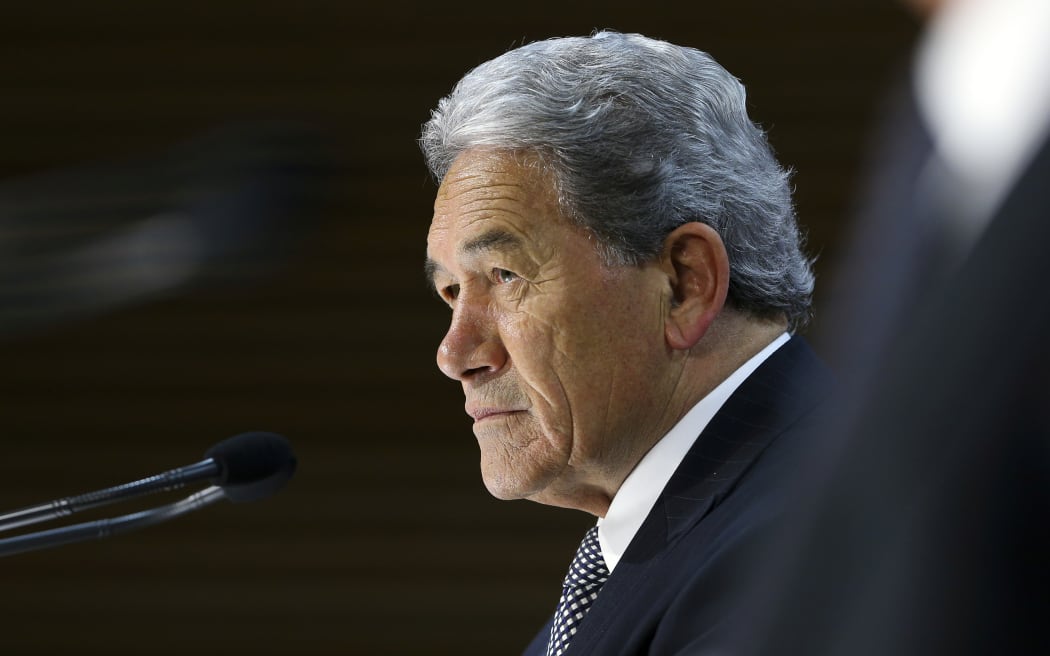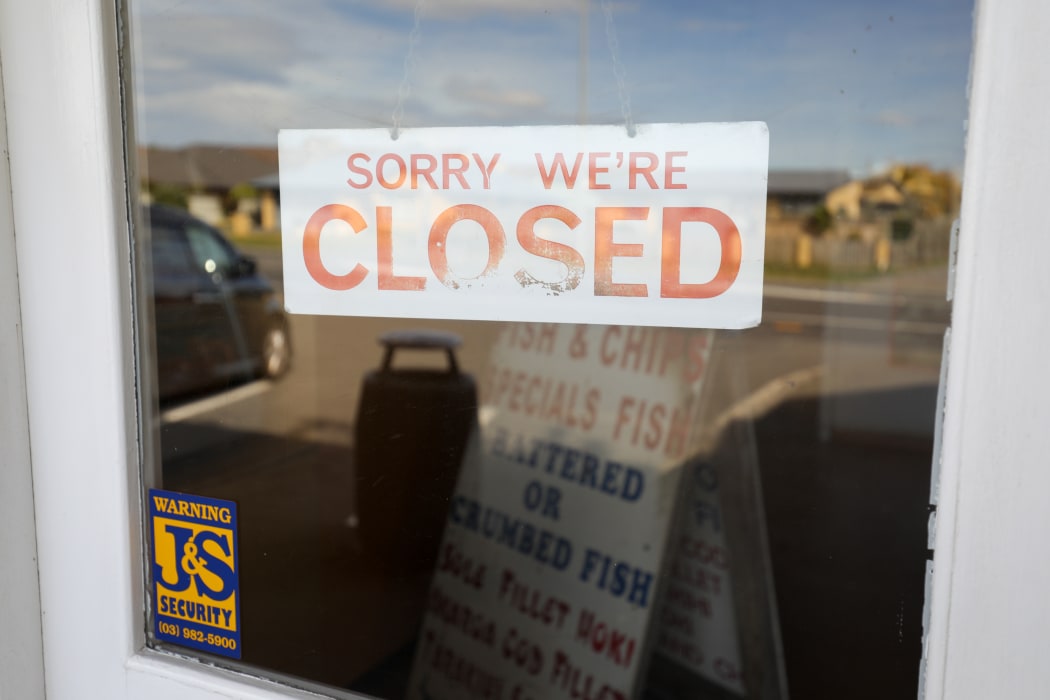After hammering out a deal over commercial rents with Labour, New Zealand First is now publicly criticising some of the measures its coalition partner had been pushing for, and which it ended up blocking.

New Zealand First leader Winston Peters says his party will not back a change that could have amended contract law for all existing lease arrangements. Photo: Pool / Hagen Hopkins/Getty Images
After two months of wrangling, the coalition partners have reached an agreement on how to help small businesses struggling to pay the rent.
A temporary change to the law means from today if tenants and landlords are unable to negotiate a fair price they go into compulsory arbitration.
New Zealand First leader Winston Peters said his party would not back a change that could have amended contract law for all existing lease arrangements, describing it as using a "sledgehammer to smash a nut".
Justice Minister Andrew Little hit back saying New Zealand First had, early on, promised an alternative and that arrived on Friday.
"It survived a day and even they withdrew it because it was pretty embarassing, and then we've managed to reach agreement on the terms that we did and I'm pleased that we got to this point."
He brushed off questions about coalition tensions.
"We're very close to an election. Different parties - whether part of a coalition arrangement or not - are trying to stake out their position," he said.
Little said he knew some tenants and landlords would be disappointed in the drawn-out process, but the package would provide access to arbitration in a "timely and cost-effective way".
"I am concerned that some landlords and tenants are not coming together to make agreements that reflect the seriousness and uniqueness of Covid-19, including behaviour where large commercial tenants refuse to pay rent, and landlords demanding rent from small retailers who haven't been able to operate," he said.
Peters acknowledged some businesses had been struggling with fixed costs, but said making fundamental changes to contract law was not the answer.
He said that would have been "poorly targeted policy" and affected many landlords who had made efforts to come to good arrangements with their tenants.
"Using a sledgehammer to smash a nut is not common sense. We must remember the sanctity of contracts is a crucial dimension to Settled Law", Peters said.
He told reporters Labour's original proposal would have changed contract law for all existing lease arrangements, and so limits on the size of the business were imposed.
"This is a very small minority, not the mass majority where every contract was going to see the sanctity of the contract broken - and we said you can't do that," Peters said.
He said New Zealand First had "insisted on better targeting" from Labour.
"We need to show New Zealanders we're aware of the fiscal costs of every policy decision reached... this is why we urged our coalition partner to better define the size and problem of commercial rent disputes."
He repeated his criticism at a media briefing this afternoon.
"From our perspective, the spending of taxpayers' money has got to be wise, it's got to be targeted, and it's got to have a chance of reaching the outcome that we seek which is the survival and recovery of business in this country."
However, he was adamant that New Zealand First was continuing to support the Labour Party as a coalition partner.
"The only thing that will collapse this coalition is if some people don't keep to the contract, don't keep their word.
"And I don't envisage that - we've signed up for the full term and that's what we need to do."
He was dismissive of questions over the delays, instead saying that was because "some things take time".
"If you don't think that contentious ideas and that passionate politics belongs at the Cabinet table you're in the wrong business."
He said people who did not have a good knowledge of contract law should not be in Parliament.
The dispute process is for businesses based in New Zealand with 20 or fewer full-time employees, and those who had not already struck an agreement with their landlord.
Prime Minister Jacinda Ardern said the politics of arriving at the deal were secondary to fixing the problem.
"We knew it was causing pain for small businesses, and now we've seen an outcome on that issue that will support many many people in very difficult circumstances," she said.
"So that is the most important thing, secondary to that is party politics and the fact that we're in an election year."
Deal example of "coalition dysfunction" - National Party
National Party finance spokesperson Paul Goldsmith said small businesses had been the "victim of coalition dysfunction".

National Party finance spokesperson Paul Goldsmith. Photo: RNZ /Dom Thomas
New Zealand First and Labour wasted nearly two months arguing about what to do, and this scheme would be too little to late for many businesses, he said.
"National argued in the Budget period that we should be getting cash into the hands of those small businesses, whether to use it on rent or other costs that they've faced. The government didn't do that, and they've been very slow to deal with those day to day costs," he said.
Goldsmith said continued public disagreements between the coalition partners could spook potential investors.
"That's the real worry, at a real time of economic crisis where we need clarity around policy and where the government is going, what you see is lots of internal argument and posturing by New Zealand First," he said.
"And so that just makes it more difficult for people to have the confidence to invest. Because ultimately how we're going to get out of this difficulty, it's going to be private sector investment, people investing to rebuild their business."
Industry response
This is all against the backdrop of high levels of commercial rent - especially in retail - not being paid.

Many local food stores were shut during the Covid-19 alert level 4 lockdown earlier this year. Photo: RNZ / Nate McKinnon
Tom Wallace is the founder of the cloud-based commercial software property firm Released, which collects data on rents.
He said the number of commercial tenants paying their rents last month remained at a "very low level".
In retail, about half the rents had not been paid but there had been an improvement in the office sector.
"Which really does reflect businesses who've been able to return as the government has eased restrictions."
Retail had been "hardest hit", he said, not being able to trade at full capacity, but half the rent being paid was also a result of agreements reached with landlords to "share the pain equally", because maintaining a longer term relationship was in everyone's interests.
Although there was a "slight improvement" from April through to May, with 69 percent of rents being paid but that was still "significantly down" from usual levels, Wallace said.
The arbitration announced today would not make much difference, he said, because most landlords and tenants who could come to an agreement already had done so.
Property Council chief executive Leonie Freeman agreed the impact of today's announcement would be minimal; it was her understanding about 80 percent of tenants and landlords in the office sector had reached an agreement.
However, she said the dispute process would provide a "mechanism" for the "small number" who had not yet reached an agreement.
Of more concern was the time this had taken and with no industry consultation, Freeman said, and that it was "breaching sanctity of contract".
"We haven't seen, for example, the banks being forced to sit down with people who own houses to arbitrate if they can't pay the rent."
Back in early April, Freeman said the council put forward a suggestion that if a business had lost at least half its revenue due to Covid-19, the tenant could receive a government funded 50 percent rent subsidy over a four-week period, with the rest to be negotiated.
"Everybody's in this, everybody's got to share the pain but we probably needed action much, much earlier" because people needed certainty before moving into recovery, she said.
Small retail businesses were the hardest hit, Freeman said, and there would be more job losses in that sector.







